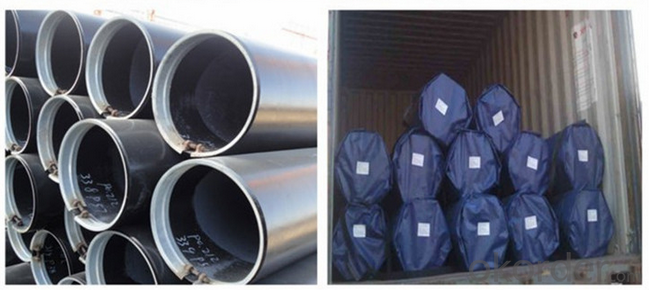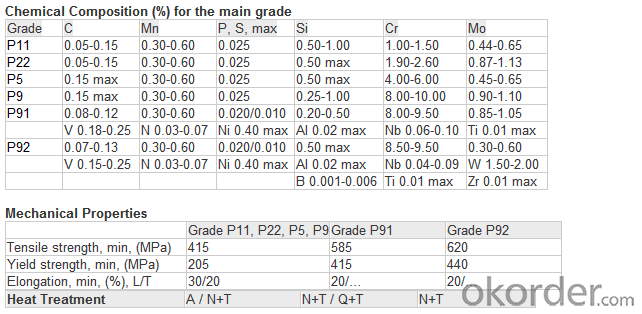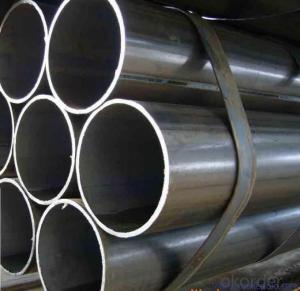P5 Seamless Ferritic Alloy-Steel Pipe for High-Temperature Service for High-Temperature
- Loading Port:
- Shanghai
- Payment Terms:
- TT OR LC
- Min Order Qty:
- 1000 kg
- Supply Capability:
- 10000 kg/month
OKorder Service Pledge
OKorder Financial Service
You Might Also Like
ASTM A335 Seamless Alloy-Steel Pipe
Standard: BS 1139, BS 3059-2, JIS G3454-2007
Grade: 10#-45#, 15NiCuMoNb5, 10Cr9Mo1VNb
Detailed introduction to ASTM A335 seamless alloy steel pipe:
ASTM A335 seamless alloy steel pipe

Packaging Detail: | Bundle or Container or as per customers requirement. |
Delivery Detail: | within 25 days after we receive an irrevocable L/Cor 30% deposit |
ASTM A335 Seamless Alloy-Steel Pipe
Standard: BS 1139, BS 3059-2, JIS G3454-2007
Grade: 10#-45#, 15NiCuMoNb5, 10Cr9Mo1VNb
Detailed introduction to ASTM A335 seamless alloy steel pipe:
ASTM A335 seamless alloy steel pipe


FAQ:
1) why you chose us ?
Professional Manufacturer and supplier of Steel pipe
More than 14 years’ professional producing experience
We can get the lowest ex-factory prices. The price are quite reasonable and it is lower than our commercial peers. also, we can guarantee the qualities of our products.
BV, ISO certificates and SGS test can be provided to assure the quality of our products.
2) Our minimum order quantity:
10 Metric Tons or one 20ft or 40ft Container.
3) How about the Delivery Time?
The steel pipe will be produced since we getting your deposit by T/T or Your original L/C. For normal size, some stocks in our factory now, we can supply once you need.
4)What kind of payment does your company support?
T/T, 100% L/C at sight, Cash, Western Union are all accepted.
5) Do you charge for the samples?
According to our company principle, we just charge for samples, you pay for the freight /courier charge.
6) Main market:
Mid East, South America, Africa, Southeast Asia, India etc
FAQ:
1) why you chose us ?
Professional Manufacturer and supplier of Steel pipe
More than 14 years’ professional producing experience
We can get the lowest ex-factory prices. The price are quite reasonable and it is lower than our commercial peers. also, we can guarantee the qualities of our products.
BV, ISO certificates and SGS test can be provided to assure the quality of our products.
2) Our minimum order quantity:
10 Metric Tons or one 20ft or 40ft Container.
3) How about the Delivery Time?
The steel pipe will be produced since we getting your deposit by T/T or Your original L/C. For normal size, some stocks in our factory now, we can supply once you need.
4)What kind of payment does your company support?
T/T, 100% L/C at sight, Cash, Western Union are all accepted.
5) Do you charge for the samples?
According to our company principle, we just charge for samples, you pay for the freight /courier charge.
6) Main market:
Mid East, South America, Africa, Southeast Asia, India etc
- Q:What are the different types of pipe connections used with steel pipes?
- There are several types of pipe connections used with steel pipes, including threaded connections, welded connections, flanged connections, and grooved connections.
- Q:How can seamless steel tubes be produced?
- Seamless steel tubes are made of ingots or billets made by piercing and are then made by hot rolling, cold rolling or cold casting. Seamless steel tube plays an important role in the steel tube industry of our country. According to incomplete statistics, China's existing seamless tube production enterprises about more than 240, seamless steel pipe units about more than 250 units, with an annual output capacity of about about 4500000 tons. From the caliber, 35% of phi 76, less than phi 159-650, accounting for 25%. From the species point of view, the general use of 1 million 900 thousand tons of pipe, accounting for 54%; oil pipe 760 thousand tons, accounting for 5.7%; hydraulic props, precision pipe 150 thousand tons, accounting for 4.3%; stainless steel pipe, bearing tube, automobile tube 50 thousand tons, accounting for 1.4%.
- Q:What are the different methods of cutting steel pipes?
- The different methods of cutting steel pipes include using a hacksaw, pipe cutter, angle grinder with a cutting disc, reciprocating saw, plasma cutter, or oxy-fuel torch.
- Q:Are there specifications for scaffold steel pipe with 48mm * 3.2mm?
- Scaffold tubes are our name for materials used to build scaffolding, because most scaffolding uses tubular bamboo or steel tubing. Bamboo and other bamboo is for a long time in the use of the scaffolding tube, but due to lack of safety and durability, now only in rural and urban area construction is lagging behind some of the home building small building has been used. The modernization construction, the most commonly used type of scaffolding pipe is steel pipe, the scaffolding should not only meet the demand of workers, but also to meet the characteristics of scaffolding firm and durable, so tough hard steel is the best choice. The selected steel pipe generally requires smooth surface, no cracks, no bending, no rust, and meet the relevant national standards.
- Q:How do steel pipes compare to other types of piping materials?
- Steel pipes are highly durable and have excellent strength, making them superior to other types of piping materials in terms of longevity and resistance to extreme conditions. They are also more cost-effective, as steel pipes require less maintenance and have a longer lifespan. Additionally, steel pipes have better corrosion resistance, making them ideal for various applications, especially in industries where chemical exposure is common.
- Q:How do you join steel pipes together?
- Steel pipes can be joined together using various methods, including welding, threaded connections, flanges, and mechanical couplings. The most common method is welding, where the ends of the pipes are heated and fused together using a welding electrode. Threaded connections involve screwing the pipes together using male and female threads. Flanges are used for larger pipes and involve bolting two flanges together with a gasket in between. Mechanical couplings use compression or clamping mechanisms to connect pipes without the need for welding or threading.
- Q:Can steel pipes be used for water supply lines?
- Yes, steel pipes can be used for water supply lines. Steel pipes are commonly used in industrial and commercial applications for transporting water and other fluids. They offer a high level of durability and strength, making them suitable for high-pressure systems. Additionally, steel pipes have excellent resistance to corrosion, which is important for maintaining the quality and safety of the water supply. However, it is essential to ensure that the steel pipes used for water supply lines are properly coated or lined to prevent any potential contamination of the water.
- Q:Are steel pipes resistant to chemicals and corrosion?
- Yes, steel pipes are generally resistant to chemicals and corrosion. Steel pipes are often coated with protective layers such as zinc or epoxy to enhance their resistance to corrosion. These coatings act as a barrier, preventing chemicals from coming into direct contact with the steel and reducing the risk of corrosion. Additionally, steel itself has inherent corrosion-resistant properties, making it a suitable material for many applications where exposure to chemicals and corrosive elements is common. However, it is important to note that the level of resistance may vary depending on the specific type of steel, the coating used, and the specific chemicals or corrosive substances involved. Therefore, it is advisable to consult with experts and consider the specific requirements of the intended application to ensure the appropriate choice of steel and protective measures are taken to maximize resistance to chemicals and corrosion.
- Q:20# seamless steel pipe and seamless steel pipe 20G what is the difference?
- The difference is: 20# ordinary steel seamless steel pipe. 20G is the type of steel for high pressure boiler tubes.
- Q:Can steel pipes be used for underground water supply?
- Yes, steel pipes can be used for underground water supply. However, it is important to consider factors such as corrosion resistance and proper coating to protect the pipes from potential degradation caused by the surrounding soil and water chemistry. Additionally, regular maintenance and inspections are necessary to ensure the longevity and integrity of the steel pipes in underground water supply systems.
1. Manufacturer Overview |
|
|---|---|
| Location | |
| Year Established | |
| Annual Output Value | |
| Main Markets | |
| Company Certifications | |
2. Manufacturer Certificates |
|
|---|---|
| a) Certification Name | |
| Range | |
| Reference | |
| Validity Period | |
3. Manufacturer Capability |
|
|---|---|
| a)Trade Capacity | |
| Nearest Port | |
| Export Percentage | |
| No.of Employees in Trade Department | |
| Language Spoken: | |
| b)Factory Information | |
| Factory Size: | |
| No. of Production Lines | |
| Contract Manufacturing | |
| Product Price Range | |
Send your message to us
P5 Seamless Ferritic Alloy-Steel Pipe for High-Temperature Service for High-Temperature
- Loading Port:
- Shanghai
- Payment Terms:
- TT OR LC
- Min Order Qty:
- 1000 kg
- Supply Capability:
- 10000 kg/month
OKorder Service Pledge
OKorder Financial Service
Similar products
New products
Hot products
Related keywords






























